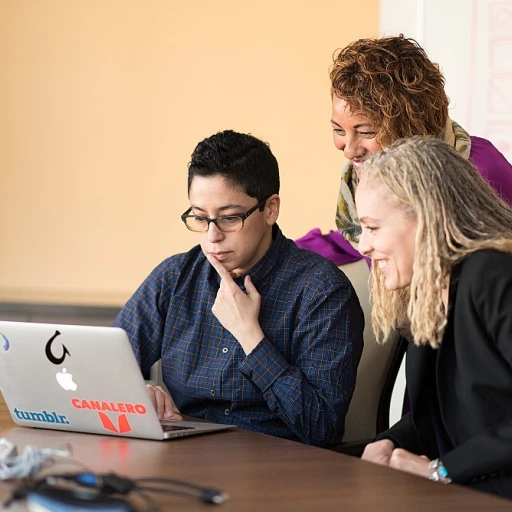Understanding the Role of AI in HR
AI in Modern Resource Management
Artificial Intelligence (AI) is revolutionizing the landscape of human resource management (HRM), assisting professionals in adapting to rapid changes in the work environment. The integration of AI into various HRM practices is a game-changer, offering data-driven solutions that enhance decision making and improve efficiency. This innovation opens the door to a more dynamic personnel management system, elevating both professional and organizational standards. AI has the capacity to streamline recruitment and selection, making these processes more efficient and effective. By utilizing AI, human resources can harness data analytics to improve recruitment strategies and identify the best candidates for specific roles. This enables businesses to develop an edge in a competitive job market, ensuring the best talent is acquired while reducing the time and resources spent. The implementation of AI allows for advanced workforce management, promoting active listening and more effective communication within teams. AI systems can analyze employee data to generate insights, supporting decision-making processes that cultivate a positive work environment and enhance employee relations. The focus on diversity and inclusion in employee engagement is further augmented as AI algorithms can identify gaps and suggest data-driven strategies. Effective training development and professional development are critical components of a successful HR strategy. AI supports trainers in crafting tailored training programs that align with company goals and employee aspirations, maximizing the productivity and skills development of the workforce. This technology can forecast training needs and track progress, ensuring that both personal and organizational growth are prioritized. For more in-depth insights into how AI is shaping human resource practices, you can explore its role at Workday in Santa Clara through this informative article.Enhancing Recruitment Processes
Revolutionizing Recruitment and Hiring
Artificial intelligence has become an essential component of human resource management, notably enhancing recruitment processes by introducing more sophisticated, data-driven techniques. Organizations have long sought effective solutions to streamline recruitment selection, an integral part of HR practices. AI tools now offer professionals the opportunity to refine and elevate these processes, ultimately enabling HR teams to make more informed decisions. One of the significant advantages of integrating AI in recruitment is its ability to handle vast volumes of applications with remarkable speed and precision. This capacity allows HR personnel to focus on strategic human resource tasks and candidate relations. By leveraging AI algorithms, companies can efficiently sift through resumes, identifying potential candidates based on specific criteria. This method not only saves time but also ensures a more objective evaluation, reducing the risks of unconscious bias and promoting diversity and inclusion. AI isn’t just about automation; it's about transformation. It empowers recruiting teams to align closely with the needs of the business. With AI's predictive analytics, HR managers can gauge a candidate's future performance and cultural fit within the organization. This foresight is invaluable for identifying individuals who will thrive in their roles and positively influence the work environment. Moreover, AI-fueled chatbots facilitate effective communication by providing real-time responses to candidate inquiries. This technological intervention not only enhances the candidate experience but also upholds professionalism throughout the recruitment process. In embracing AI, professionals are urged to adapt their skills to leverage new tools effectively, combining their expertise with innovative solutions. This seamless integration of technology in recruitment highlights a promising direction for evolving HR practices, where human intelligence collaborates with advanced technologies to foster a more efficient and inclusive workplace. To continue exploring the potential of AI in recruitment and human resource transformation, you can delve further into these opportunities with Toro Careers in AI for HR. The future beckons with possibilities for continued improvement and growth in this vital domain.AI and Employee Engagement
Promoting Workplace Interaction and Connectivity with AI
In the rapidly evolving landscape of human resources, professionals are continually seeking ways to improve employee relations and foster a positive work environment. Artificial intelligence offers innovative solutions to engage employees effectively, playing a transformative role in personnel management and contributing significantly to professional development.
AI-powered tools can enhance effective communication within organizations, facilitating active listening and delivering data driven insights. By analyzing feedback and interactions, AI helps hrm professionals in identifying trends and patterns that were previously hard to detect. This capability allows for more effective decision making, ensuring that professional practices align with the needs and expectations of the workforce.
Moreover, AI helps in understanding employees' performance through objective metrics, helping management craft personalized engagement strategies. By utilizing AI, businesses can tailor their approach to meet diverse employee needs, enhancing their skills and overall job satisfaction. For instance, AI can play a crucial role in gathering feedback via digital surveys and providing insights into employee satisfaction and engagement levels, thereby facilitating a more personalized approach to employee engagement.
AI also plays a pivotal role in promoting diversity and inclusion within the workplace. By reducing biases in recruitment selection and promotion processes, AI helps ensure that all employees feel recognized and valued for their skills and contributions. Such initiatives not only improve morale but also drive the organization's strategic objectives by leveraging a broad spectrum of experiences and perspectives.
Incorporating AI into human resources management leads to a culture of continuous development where employees are empowered to learn and grow. For further insights into establishing fair AI practices in HR, refer to this comprehensive guide.
Training and Development with AI
Integrating AI in HR Training and Development Initiatives
In the rapidly advancing field of human resource management, AI is no longer a futuristic concept but a reality that is transforming training and development strategies within organizations. Leveraging artificial intelligence can significantly elevate the effectiveness of these programs, which are critical for employees' professional development and the overall success of a business. AI offers HR professionals a data-driven approach to tailor training sessions that best fit the needs of employees. This personalized learning experience ensures that employees acquire job-relevant skills, which enhances their performance and productivity. By using AI to analyze employee performance and skill gaps, HR can craft bespoke training modules that align with both organizational goals and personnel management best practices. As businesses strive to maintain a motivated workforce, integrating AI can facilitate active learning methods that make training development more engaging. AI-powered platforms can simulate real-world scenarios, thereby enabling employees to practice problem-solving and decision-making in a controlled environment. This hands-on approach not only improves individual performance but also boosts employee engagement levels. Moreover, the use of AI in training and development aligns well with ethical HRM practices by promoting diversity and inclusion. By minimizing human biases in talent development, organizations can ensure fair and equal opportunities for employees from diverse backgrounds. However, it is crucial to balance AI-driven practices with soft skills that remain vital in any work environment. While AI can enhance organizational efficiencies, human-centric skills like active listening and effective communication should continue to be fostered and valued. In this context, HR professionals play a strategic role in designing training programs that emphasize both technical proficiencies and interpersonal competences. To sum up, AI stands as a robust ally in the growth and development of human resources. By harnessing its full potential in training and development initiatives, organizations can build a dynamic and competitive workforce poised for future challenges and opportunities in the professional realm.Ethical Considerations and Challenges
Balancing AI Integration with Ethical Practices
Artificial intelligence is transforming human resource management, promising improved efficiency in processes like recruitment and training. However, as organizations integrate AI tools, ethical considerations must be at the forefront. This ensures a harmonious work environment where employees feel valued and respected. AI systems that handle recruitment selection, for example, must do so with fairness. While AI can streamline processes and reduce biases, professionals leveraging these systems should implement checks and balances. This helps maintain diversity and inclusion, fostering an environment where different skills and perspectives are valued. Moreover, transparency in AI-driven decision making is crucial. Employees should be informed about how these systems affect their job prospects and work environment. Clear communication and active listening are vital so that personnel management doesn't feel impersonal or overly data driven.Upholding Human Dignity and Respect
Training development and performance management are other domains where AI plays a significant role. However, professional development should not be solely dependent on algorithms. Human oversight ensures decisions uphold individual dignity and respect. By prioritizing ethical standards, businesses not only enhance trust but also improve employee relations. For strategic human resource management, using AI ethically involves continuous training. HR professionals should stay updated on best practices concerning AI integration. This proactive approach ensures they are fully equipped to manage these powerful tools effectively.Addressing the Challenges Head-On
While AI offers numerous benefits, challenges such as data privacy cannot be ignored. An organization's responsibility is to protect employee data rigorously. Ethical practices call for stringent measures to guard against unauthorized access and misuse. Furthermore, deploying AI requires a commitment to upholding professionalism. It is essential to view AI not as a replacement but a resource that complements human skills. Problem solving in HR demands both AI capabilities and the nuanced understanding that only humans can provide. Ultimately, as AI continues to reshape HRM, embedding ethical considerations demonstrates an organization's commitment to maintaining a fair and effective work environment. Emphasizing these values not only enhances the reputation of an organization but also contributes to a more balanced and conscientious professional landscape.Future Trends in AI and HR Professionalism
Embracing the Future of AI in Human Resources
The future of artificial intelligence in human resources is not just a distant possibility; it is an evolving reality that is reshaping the landscape of HRM. As organizations continue to integrate AI technologies, the focus is on enhancing professionalism and efficiency in various HR functions. This transformation is paving the way for more strategic human resource management, where data-driven decisions become the norm rather than the exception.
AI-Driven Performance Management
Performance management is set to become more effective with AI. By analyzing employee data, AI can provide insights into job performance, helping HR professionals tailor development plans to individual needs. This personalized approach not only boosts employee performance but also fosters a work environment where employees feel valued and understood.
Professional Development and Training
AI is revolutionizing training development by offering personalized learning experiences. As discussed earlier, AI can identify skill gaps and recommend targeted training programs. This ensures that employees acquire the necessary skills for their roles, promoting continuous professional development. Organizations can leverage AI to create a culture of lifelong learning, where employees are encouraged to enhance their skills regularly.
Enhancing Diversity and Inclusion
AI tools are also being used to promote diversity and inclusion within the workplace. By removing biases from recruitment selection processes, AI ensures a fairer and more equitable approach to hiring. This not only enhances the professionalism of HR practices but also contributes to a more inclusive work environment where diverse perspectives are valued.
Challenges and Ethical Considerations
While AI presents numerous opportunities, it also brings challenges that need to be addressed. Ethical considerations, such as data privacy and the potential for algorithmic bias, must be at the forefront of AI implementation in HR. Organizations must adopt best practices to ensure that AI is used responsibly, maintaining trust and transparency with employees.
Preparing for the AI-Driven HR Future
To prepare for the future, HR professionals must develop skills in data analysis and decision making. This will enable them to effectively leverage AI tools to improve HR processes. Additionally, fostering soft skills such as active listening and effective communication will remain crucial in maintaining strong employee relations.
As AI continues to evolve, its role in human resources will expand, offering new opportunities for enhancing professionalism and efficiency. By embracing these changes, organizations can ensure they remain competitive in an ever-changing business landscape.












